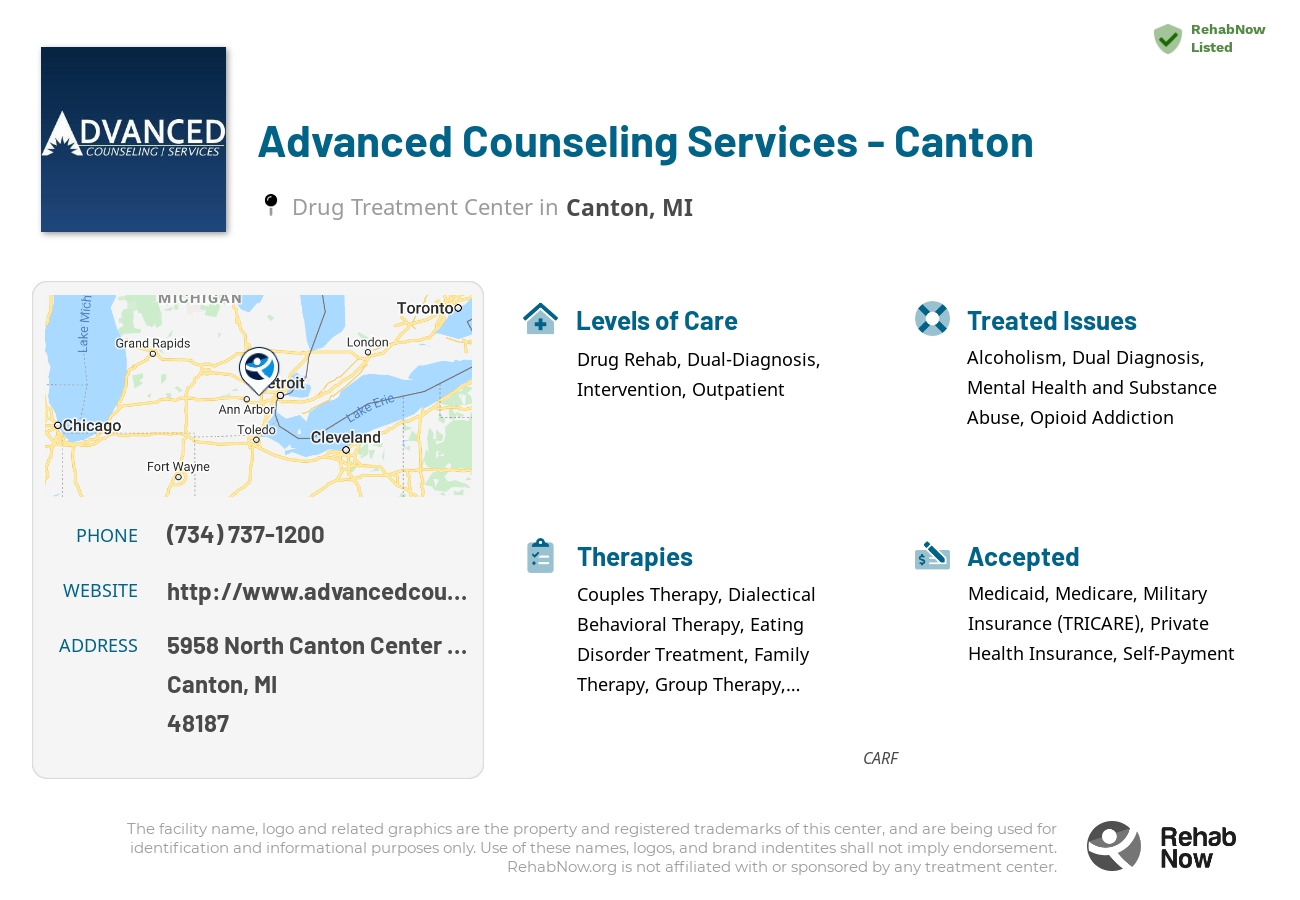Advanced Counseling Services - Canton
Drug Rehab Center in Canton, Michigan
Advanced Counseling Services - Canton is an accredited addiction and substance abuse treatment center in Michigan that offers comprehensive, client-centered therapy services, including inpatient and outpatient treatment, individual, family, and group counseling, and evidence-based therapies, to help individuals and families in their recovery from addiction and substance abuse.
About Advanced Counseling Services - Canton in Michigan
Advanced Counseling Services - Canton is an addiction and substance abuse treatment center located in Canton, Michigan. Founded in 1978, this organization is dedicated to providing comprehensive, high quality, client-centered therapy services for individuals, couples and families. Their staff of experienced, licensed counselors specialize in a variety of issues, including addiction, depression, anxiety, PTSD, and trauma. They offer services for both inpatient and outpatient treatment, and can provide individual, family, and group counseling, psychoeducational assessments, and Crisis Intervention services.
Advanced Counseling Services - Canton's addiction and substance abuse treatment programs focus on helping individuals develop an understanding of the root causes of their addiction and how it affects their life. They have a multi-disciplinary approach to treatment, combining evidence-based therapies, group therapy, and various holistic therapies. They also provide relapse prevention training and education, to help ensure that clients can continue to maintain their recovery.
Advanced Counseling Services - Canton is fully accredited by the Commission on Accreditation of Rehabilitation Facilities (CARF) and is licensed by the Michigan Department of Health and Human Services. They are members of the Michigan Association of Alcohol and Drug Treatment Programs and have been recognized with a 2018 Excellence in Substance Abuse Treatment & Prevention award from the Michigan Department of Health and Human Services. They are committed to providing compassionate and professional care to help individuals and families in their recovery from addiction and substance abuse.
Genders
Ages
Modality
Additional
Accreditations

CARF
The Commission on Accreditation of Rehabilitation Facilities (CARF) is a non-profit organization that specifically accredits rehab organizations. Founded in 1966, CARF's, mission is to help service providers like rehab facilities maintain high standards of care.
Conditions and Issues Treated
Opioid addiction treatment should be done in a medically supervised drug rehab. While taking opioids, users will typically use other substances to enhance the effects of opioids or to reduce the adverse effects of opioid use. Opioid addiction treatment will include detoxification and drug rehab counseling to help both the user and their loved ones learn how to live a successful sober lifestyle.
Treatments such as methadone, buprenorphine, and naltrexone are three medications that can help treat opioid addiction. These drugs work on the brain’s pleasure center and reduce cravings and the effects of illicit opioids such as heroin. These drugs can be either given orally or by injection. Individual drug rehab counseling sessions can be helpful to discuss any questions or concerns with the drug treatment program. This counseling will also help the user set goals for when they finish drug rehab.
Opioid addiction recovery is a long process. Many of the changes to the brain caused by opioid use cannot be undone, but with time and the proper treatment, a person can return to normal function. After detox, treatment will include drug rehab counseling and entering a halfway house or sober living community. Aftercare is critical to long-term recovery, as it helps the user avoid relapsing and entering back into drug rehab.
Levels of Care Offered
This center offers a variety of custom treatment tailored to individual recovery. Currently available are Drug Rehab, Dual-Diagnosis, Intervention, Outpatient, with additional therapies available as listed below.
“Outpatient treatment is ideal for those who have a lower intensity addiction. It’s also suitable for those with a supportive environment and those on a tight budget.
Outpatient treatment can be considered the lowest intensity level of addiction treatment. It is ideal for early phase addiction or lower intensity addictions. It may involve weekly sessions instead of daily. Peer group support, 12-step programs, and individual counseling may still be used and anti-addiction medication.
Drug rehab intervention aims to make sure patients understand the risks of their addiction and possible outcomes. They must learn how their addiction affects those around them and allow a therapy session to help move past the physical symptoms. They often include psychotherapy or behavioral therapy, group therapy, family counseling, and peer support.
Therapies & Programs
No single treatment works for all addicts; therefore, the goal of treatment and therapy should be to find what works best for each individual. Some people requiring addiction treatment may only need a few weeks of inpatient care. Others will require long-term residential care. Tolerance and withdrawal levels vary from person to person and thus affect the intensity of the treatment needed.
If an individualized approach to treatment and therapy is not offered, addicts may fail to reap benefits from their efforts. Professionals must customize plans according to their patient’s needs, limitations, and strengths. The goal of all forms of addiction treatment should be for addicts to find healthy ways to cope with their addiction and its underlying causes.
Couples therapy for drug addiction is a unique form of therapy that allows family members to work through the emotional issues of their loved one’s addiction together. Family members can support each other while learning how to cope with the addiction and encourage healthy changes.
Accordingly, couples therapy for drug addiction is designed for an addict and their significant other or spouse. The two will work with a therapist to learn how the addiction affects themselves and the relationship and how to break the negative patterns of behavior that may have developed.
Drug addiction can destroy a person’s life, as well as their family and friends. The loss of one’s ability to choose how to live and behave often leads the addict into depression, anger, guilt, and many emotional problems.
The therapies usually include siblings, children, and parents who are involved in their daily lives. These sessions are vital because they address past issues that may have hampered an addict’s or alcoholic’s recovery and provide support at a crucial time!
One of the most critical aspects of family therapy is helping addicts’ loved ones see their situation in a new light. It’s also one of the most challenging things a family can do when a loved one struggles with addiction or alcoholism.
Group therapy is held in a safe, controlled setting where patients can feel comfortable sharing their struggles and gaining perspective through shared conversations. It takes place in a group rather than one on one to prevent feelings of isolation or being unique in their situation while creating an environment for addicts at Advanced Counseling Services - Canton to develop fellowship, accountability, and support. Group therapy is an important tool in recovery that prevents cravings that prompt a return to active addiction.
This type of therapy involves the use of a variety of therapeutic techniques to help addicts recover from past traumas that might have triggered their substance abuse. During these sessions, therapists will work with the addict to address painful memories and learn how to cope effectively with stressors as they arise.
During these types of sessions, therapists will typically focus on three main goals:
- Identifying and expressing painful emotions associated with past traumas.
- Reducing the effects of stress on an addict’s life by developing more effective coping mechanisms.
- Developing healthy ways of thinking about stressful situations that can help addicts avoid substance abuse issues in the future.
This type of therapy is typically used in conjunction with other types of addiction treatment services. By identifying and dealing with the root cause of addiction, most addicts can overcome their cravings and prevent relapse once they leave rehab.
Many different types of addiction treatment services exist to help addicts safely get sober, but it’s important for recovering individuals to find a therapist or support group that will help them address the root cause of their addiction.
Dialectical Behavior Therapy is a form of Cognitive Behavioral Therapy that helps patients understand the relationship between their thoughts, feelings, and behaviors. It is beneficial for those whose addictions and behaviors stem from severe mental health issues. It aims to help the patient achieve their goals and identify how they can enhance their lives.
Cognitive-behavioral therapy is a talking-based method that helps people struggling with addiction replace destructive behaviors with healthier ones. CBT also helps them identify the underlying thoughts and beliefs that cause these behaviors in the first place and ways to control those thoughts and feelings. It can be administered as a holistic therapy or as part of combination therapy and—as opposed to turning to drugs and alcohol—helps addicts learn how to respond to negative thoughts instead.
Payment Options Accepted
For specific insurance or payment methods please contact us.
Is your insurance accepted?
Ask an expert, call (888) 674-0062
Advanced Counseling Services Associated Centers
Discover treatment facilities under the same provider.
- Advanced Counseling Services - Clarkston in Clarkston, MI
- Advanced Counseling Services - Taylor in Taylor, MI
- Advanced Counseling Services - Saint Clair Shores in Saint Clair Shores, MI
- Advanced Counseling Services - Canton in Canton, MI
- Advanced Counseling Services - Clair Shores in Saint Clair Shores, MI
Learn More About Advanced Counseling Services Centers
Additional Details
Specifics, location, and helpful extra information.
Canton, Michigan 48187 Phone Number(734) 737-1200 Meta DetailsUpdated November 25, 2023
Staff Verified
Advanced Counseling Services - Canton Patient Reviews
There are no reviews yet. Be the first one to write one.
Canton, Michigan Addiction Information
Michigan has the second-highest rate of drug and alcohol abuse in the nation. Heroin is linked to more than 50% of the state's hepatitis C cases. Marijuana is the drug most often associated with crimes in Michigan, followed by methamphetamines. Opioids alone are responsible for almost 20% of all drug overdose deaths in Michigan.
In 2016, there were 842 opioid-related deaths in Michigan, and Canton accounted for 21 of those deaths. 83,000 people in Canton struggle with addiction and 1,100 went to rehab in 2016. Treatment options include inpatient and outpatient rehab programs, 12-step support groups, and detoxification programs. Choosing a treatment program that will fit your individual needs and preferences is important.
Treatment in Nearby Cities
- Escanaba, MI (295.9 mi.)
- Albion, MI (65.0 mi.)
- Berrien Center, MI (145.3 mi.)
- White Cloud, MI (143.4 mi.)
- Lexington, MI (81.3 mi.)
Centers near Advanced Counseling Services - Canton
The facility name, logo and brand are the property and registered trademarks of Advanced Counseling Services - Canton, and are being used for identification and informational purposes only. Use of these names, logos and brands shall not imply endorsement. RehabNow.org is not affiliated with or sponsored by Advanced Counseling Services - Canton.











